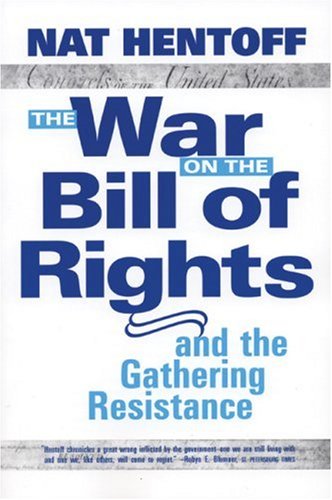- Date: 30.11.2008
- Book: The War on the Bill of Rights#and the Gathering Resistance
- Author: plappen
Review
The War on the Bill of Rights and the Gathering Resistance, Nat Hentoff, 2003, ISBN 1583226214The US Constitution, specifically the Bill of Rights (the first ten Amendments) is supposed to be the law of the land. This book tells how, since 9/11, it has been shredded by the USA PATRIOT Act, in the name of security.
It is now legal for the government to search a persons home without informing the person being searched. It doesnt pertain to just terrorism cases; it can now apply to all criminal cases. The Fourth Amendments provision concerning reasonable searches and seizures has been subverted. The standard of probable cause required to obtain a warrant has been reduced to information that is relevant to an ongoing criminal investigation that somehow is linked to alleged terrorism.
This is not the first time the FBI has ignored the Bill of Rights. In the COINTELPRO program, from 1956 to 1971, the FBI infiltrated and manipulated civil rights, antiwar and other groups that were using the First Amendment to oppose government policies. The guidelines put in place to make sure it never happens again have been thrown out by John Ashcroft.
Section 215 of the PATRIOT Act allows the FBI to walk into libraries and bookstores and demand lists of books bought or read by people who are under suspicion. The bookstore or library is forbidden to tell anyone, including the subject of the visit, that such a search has taken place.
Many self-appointed enforcers of patriotism on local school boards have been commanding the reciting of the Pledge of Allegiance every day. In some places, students are informed that they can refuse to stand and pledge as an act of conscience (courtesy of a 1943 US Supreme Court decision). Any person who does so can expect to be treated as a terrorist-lover and pariah.
Opposition to the PATRIOT Act has been growing, on both sides of the political spectrum, from the ACLU to Phyllis Schlaflys Eagle Forum. More than 100 towns and cities, plus a couple of state legislatures, have passed laws against the Act, or forbidding local law enforcement from helping the federal government to enforce the Act within local boundaries.
Even if the things discussed in this book arent exactly news, this is still an excellent book. The chapters are short, its easy to read and pretty chilling, and the author is a long-time scholar on the Constitution, so he knows what he is talking about. Very much worth reading.
Recent actions
-
toryah1988 has added Harry Potter And The Order Of The Phoenix to their read list.
-
toryah1988 has added Harry Potter And The Goblet Of Fire to their read list.
-
toryah1988 has added Atonement to their read list.
-
toryah1988 has added New Moon (The Twilight Saga) to their read list.
-
Monica has added The Da Vinci Code (Large Print) to their wish list.
